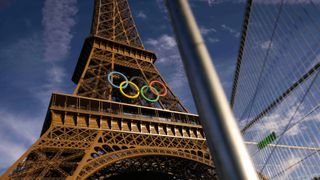Here's why I don't regret paying to stream the Olympics instead of watching for free
A small price to pay for good Olympic coverage

Since the start of the 2024 Olympic games on Wednesday, July 24, sports fans in the UK have been pretty miffed to see just how little of the event is airing for free on BBC's channels or iPlayer. Though an Ofcom Code mandates that some coverage needs to be free in the country, 'some' evidently equals 'not much'.
Instead Discovery Plus has the rights to broadcast most of the Olympics, and it costs £3.99 per month to sign up (usually £6.99, but there's a deal on during the games). Understandably, people aren't thrilled that they'll have to pay to watch the sports, which in years past used to be totally free with the BBC.
I definitely wasn't over the moon to pay my own money to watch the Olympic games, but after having signed up for Discovery Plus, I've got to say that I've definitely made the right decision.
Here's why:
A home for niche sports

Most of the BBC's main Olympic coverage focuses on the classic Olympic events like swimming, gymnastics, equestrian and the like, and if I cared about these, maybe iPlayer would be enough. But I don't.
No, my favorite sports to watch at the Olympics are the niche options. I've been enjoying watching the surfing, BMX and skateboarding, and am really looking forward to the sport climbing (which hasn't begun yet, at the time of writing).
The BBC ignores smaller events like these; I should know, I tried desperately to watch them during the Tokyo Olympics in 2021, but the Beeb only showed morsels of the surfing and perhaps a single climb. Then back to the standard old sports!
Get the What to Watch Newsletter
The latest updates, reviews and unmissable series to watch and more!
That's evidently the case this year too, but I've been using Discovery Plus to watch as much of these smaller sports as possible: no cutting away, I can see every single run or attempt in all its glory.
Being able to stream non-stop from events like these has really helped me appreciate them too. I can watch athletes from around the world competing at group stages or trials for tiny events; these are all people who are clearly just thrilled to be where they are, having a good time on the world stage.
I remember watching the BMX Freestyle heats, and seeing a South African rider called Vincent Leygonie — he didn't end up qualifying for the final but was clearly having a great time anyway, and getting to follow his rides really summed up the Olympic experience for me better than any BBC highlight reel would. In fact, athletes' moments like these are why I'm happy I paid to watch the Olympics, as I would skip stories like this if I was watching a stream that kept jumping between events.
Expert commentators

A natural side-effect of the BBC's coverage, which has two streams jumping between various sports, is that its commentators need to be jacks of all trades, providing as detailed information on marathon running as on dressage and judo.
There's nothing wrong with this, as it means their commentators can provide relevant information to viewers who may know little about the sport, and the snippets I've seen have had some great stuff. But I have very distinctive memories of the Tokyo Olympics, in which commentators were clearly struggling to get their heads around some of the new sports, and it put me off relying on the BBC for coverage like this.
Thankfully, I've been really appreciating the commentators Discovery Plus is using, which I've gathered are the same that are narrating coverage in many other parts of the world too (everywhere Warner Bros. Discovery owns broadcast rights).
All commentators seem to know the nuances of the sports, the athletes' journeys and the Olympic scoring systems, helping viewers like me understand the stakes of each run or race. Many of them also have lived experience with the sport, so can rely on their own Olympic experience or passion for the event to provide context or extra insight.
Especially useful is that most sports I've watched have multiple commentators, so they can ask each other questions or fill in the blanks in each others knowledge.
There have been a few exceptions: I switched over to the Olympic sailing for a little bit, to learn about a sport I'm unfamiliar with, and there was no commentary. All you could hear was the sound of the wind over the sea, which was certainly atmospheric but didn't really help me understand what was going on!
Ways to find new sports

I mainly signed up to Discovery Plus to watch the specific events I mentioned above, but since I was paying my own money (£3.99! the price of a whole half-pint in London!) I decided to make the most of what was on offer and watch some other sports too.
Discovery Plus has a fairly easy-to-use layout and as well as having a list of all sports, so I can easily check out when my chosen sports begin, they have a big list of all live streams happening at once. There's also a schedule so you can see upcoming ones each hour.
This list made it simple for me to find whatever events were happening at the time, and I made good use of it to ensure I was always streaming something.
I quickly found myself watching a lot of canoe slalom and handball, two sports I know next to nothing about but found entertaining to watch. I've also seen more hockey in the last four days than in my entire past life (five games compared to approximately zero) and even tuned into some swimming, judo and gymnastics, events I'm not as interested in, just to see what everyone was talking about.
I'm sure that tuning into the iPlayer sports shuffle would also help me explore new sports, but I liked how Discovery Plus gave me the freedom to pick whatever was on and try it out for myself.
I don't see myself remaining signed up to Discovery Plus for the long haul, even though the £3.99-per-month deal continues until December if you sign up before the Olympics end — it's a bit too 'daytime TV' for me. That is to say, I haven't even factored this extra library of videos into my decision-making when it comes to paying for the Olympics.
Hopefully, the BBC will get the rights to the Olympics back in the future — while I don't mind paying for all the reasons above, I'd be even happier to not have to pay! But for now it's just £3.99 to watch all the Olympic sports, and I've definitely wasted more on less before!

Tom is the streaming and ecommerce writer at What to Watch, covering streaming services in the US and UK. His goal is to help you navigate the busy and confusing online video market, to help you find the TV, movies and sports that you're looking for without having to spend too much money.